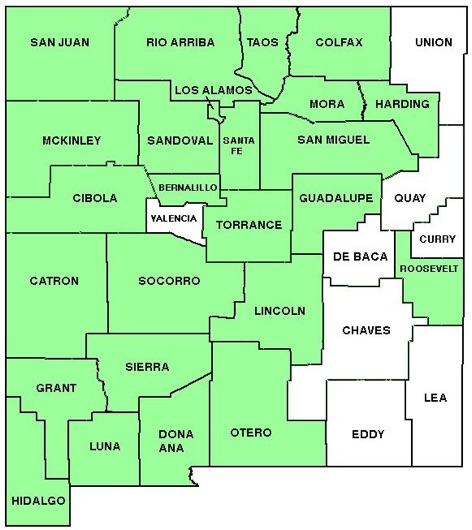WILDFLOWERS OF NEW MEXICO

Stalks to 10-inches tall bear flowers with three delicate petals nestled in a purse-like sack (spathe) that open in the morning and fade by afternoon. Note that the flowers bloom one at a time in the spathe and the petals are all identical, but the top 3 stamens differ from the bottom 3.
FLOWERS: July-September. Flowers have 3 spade-shaped, bright blue petals, and 6 stamens. The 3 showy, upper stamens have lobed “dummy anthers” colored yellow to mimic large amounts of pollen but produce very little. The 3 lower stamens have unlobed , oval anthers with abundant yellow pollen for pollinators. The spathe, with a long, leaf-like tapered tip, usually has reddish stripes.
LEAVES: Alternate. Blade 1 1/2-6 inches long (4-15 cm), linear, narrow, sheathed around stem.
HABITAT: Gravelly, granite soils, open meadows; pinyon-juniper, ponderosa, spruce-fir forests.
ELEVATION: 3,700-10,250 feet.
RANGE: AZ, CO, NM, TX.
SIMILAR SPECIES: Dayflower, C. erecta , common in eastern and southern NM, has two blue petals and one smaller white petal. Western Spiderwort, Tradescantha occidentalis, has flowers with 3 blue petals and hairy stamen filaments, and blooms in a cluster without a spathe.
NM COUNTIES: Western two-thirds of NM in mid- to high-elevation habitats: Bernalillo, Catron, Colfax, Dona Ana, Eddy, Grant, Harding, Hidalgo, Lincoln, Luna, McKinley, Moro, Otero, Rio Arriba, Roosevelt, San Juan, San Miguel, Sandoval, Santa Fe, Sierra, Socorro, Taos, Torrance.









BIRDBILL DAYFLOWER
COMMELINA DIANTHIFOLIA
Spiderwort Family, Commelinaceae
Perennial herb


















THE CONTENTS OF THIS WEBSITE ARE COPYRIGHTED AND CANNOT BE USED
WITHOUT PERMISSION OF GEORGE OXFORD MILLER


















• Spathe enclosing flower buds (left arrow).
• Leaf sheathed around stem (right arrow).










Range Map for
Commelina dianthifolia








EMAIL ME









• The top 3 stamens have showy, yellow, lobed anthers (top arrow) but produce little pollen.
• The bottom 3 stamens (lower arrow) have oval anthers that produce abundant pollen for pollinators.









